International Management Report: Expatriation in a Globalized Economy
VerifiedAdded on 2022/12/09
|9
|2599
|295
Report
AI Summary
This report explores the use of expatriation in a globalized economy, focusing on Procter & Gamble as a case study. It defines expatriation and its benefits, such as market expansion, knowledge transfer, and cultural understanding. The report then analyzes the causes of expatriate failure, including culture shock, family stress, and inadequate support. Finally, it discusses the implications of these findings for HR directors, emphasizing the importance of proper candidate selection, training, and support to ensure successful international assignments and project staffing. The conclusion summarizes the key findings and reinforces the significance of effective expatriation strategies for multinational companies seeking global success.
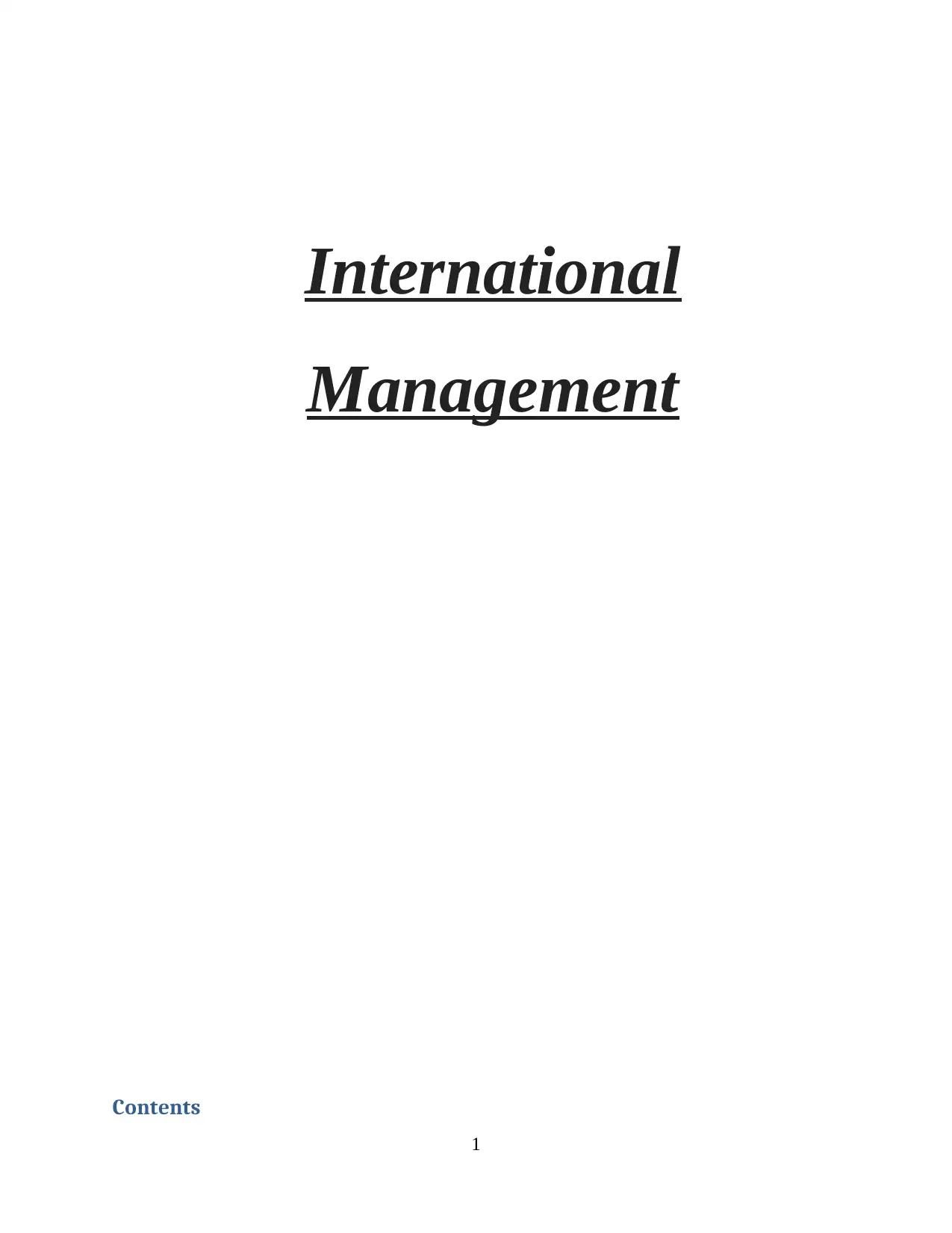
International
Management
Contents
1
Management
Contents
1
Paraphrase This Document
Need a fresh take? Get an instant paraphrase of this document with our AI Paraphraser
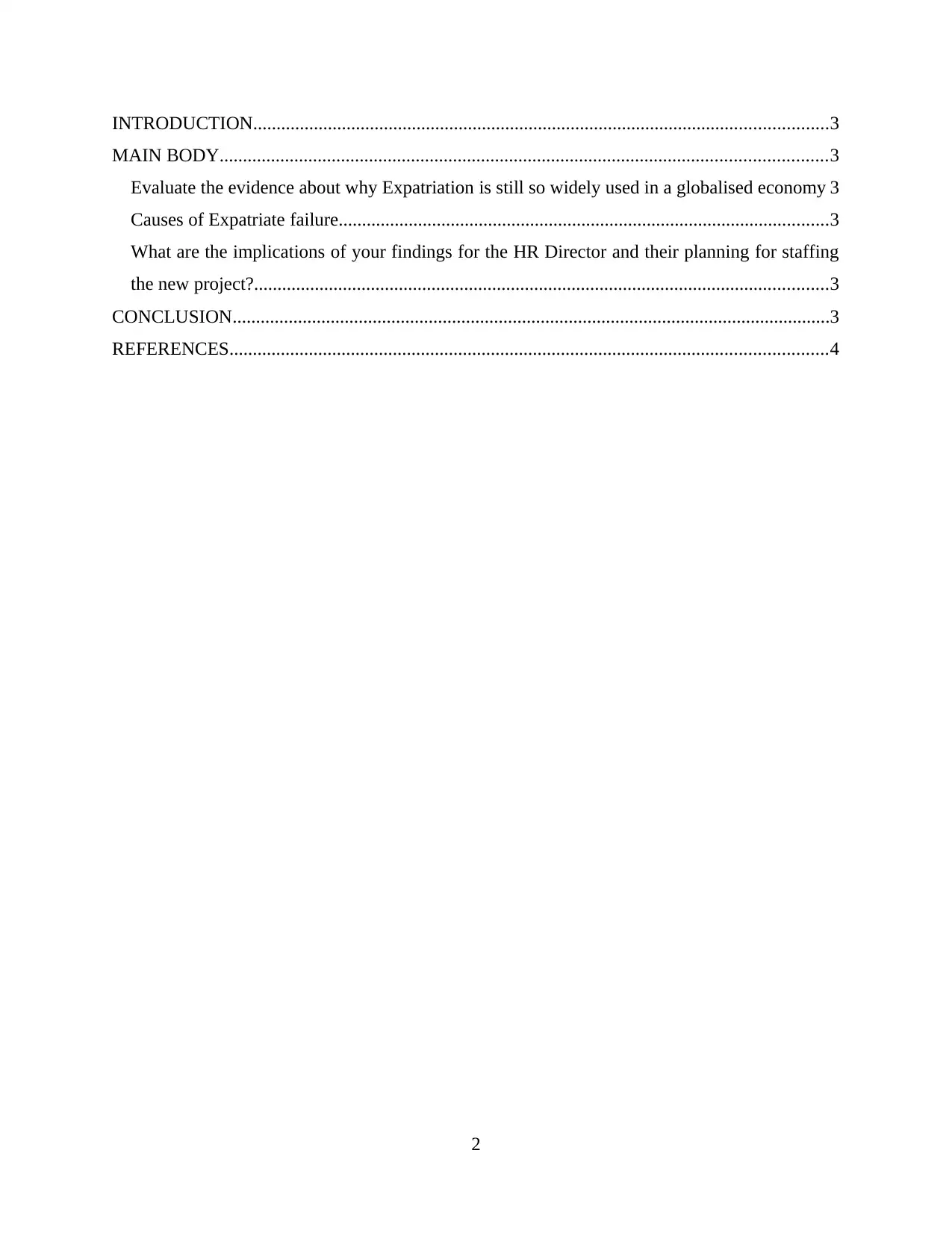
INTRODUCTION...........................................................................................................................3
MAIN BODY..................................................................................................................................3
Evaluate the evidence about why Expatriation is still so widely used in a globalised economy 3
Causes of Expatriate failure.........................................................................................................3
What are the implications of your findings for the HR Director and their planning for staffing
the new project?...........................................................................................................................3
CONCLUSION................................................................................................................................3
REFERENCES................................................................................................................................4
2
MAIN BODY..................................................................................................................................3
Evaluate the evidence about why Expatriation is still so widely used in a globalised economy 3
Causes of Expatriate failure.........................................................................................................3
What are the implications of your findings for the HR Director and their planning for staffing
the new project?...........................................................................................................................3
CONCLUSION................................................................................................................................3
REFERENCES................................................................................................................................4
2
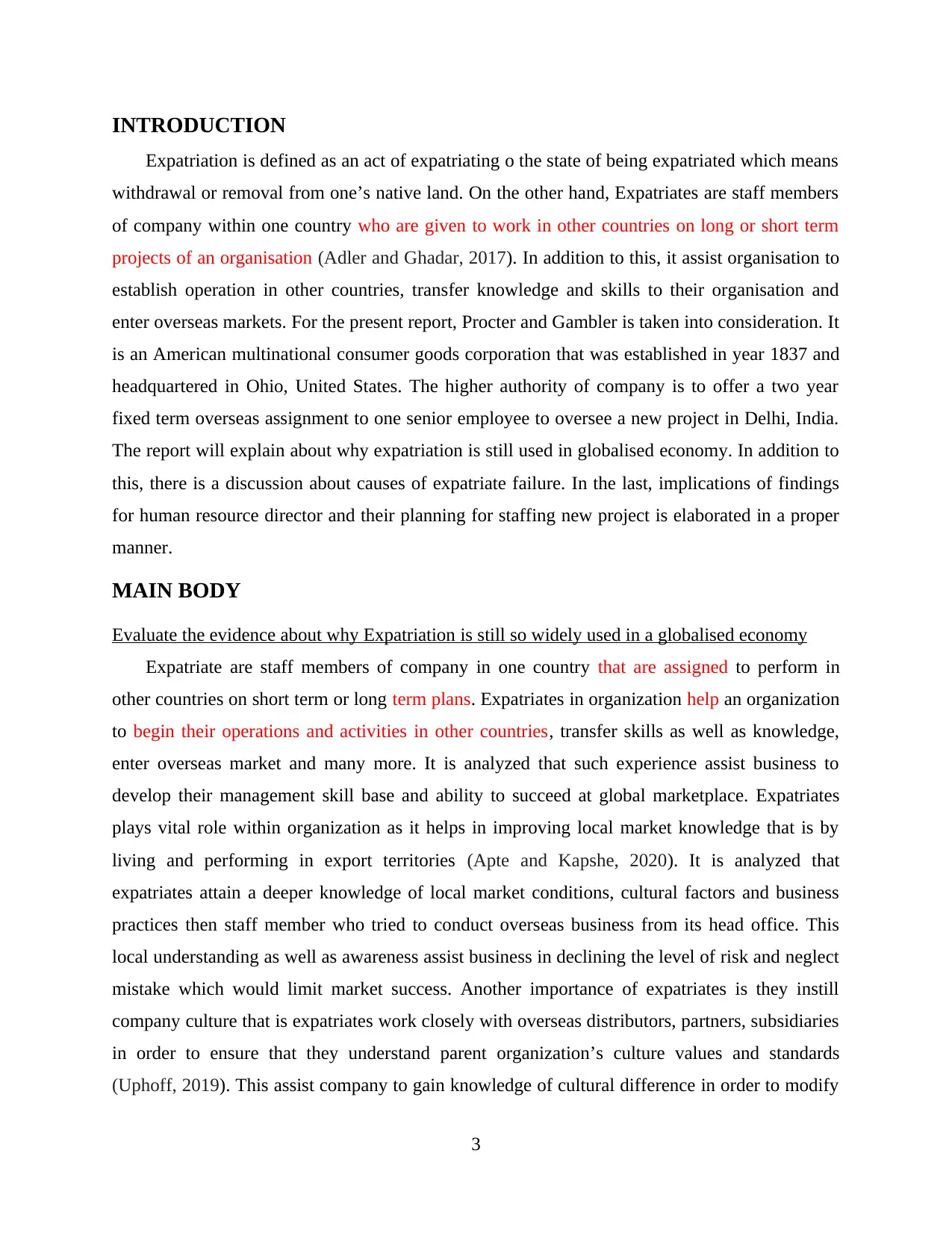
INTRODUCTION
Expatriation is defined as an act of expatriating o the state of being expatriated which means
withdrawal or removal from one’s native land. On the other hand, Expatriates are staff members
of company within one country who are given to work in other countries on long or short term
projects of an organisation (Adler and Ghadar, 2017). In addition to this, it assist organisation to
establish operation in other countries, transfer knowledge and skills to their organisation and
enter overseas markets. For the present report, Procter and Gambler is taken into consideration. It
is an American multinational consumer goods corporation that was established in year 1837 and
headquartered in Ohio, United States. The higher authority of company is to offer a two year
fixed term overseas assignment to one senior employee to oversee a new project in Delhi, India.
The report will explain about why expatriation is still used in globalised economy. In addition to
this, there is a discussion about causes of expatriate failure. In the last, implications of findings
for human resource director and their planning for staffing new project is elaborated in a proper
manner.
MAIN BODY
Evaluate the evidence about why Expatriation is still so widely used in a globalised economy
Expatriate are staff members of company in one country that are assigned to perform in
other countries on short term or long term plans. Expatriates in organization help an organization
to begin their operations and activities in other countries, transfer skills as well as knowledge,
enter overseas market and many more. It is analyzed that such experience assist business to
develop their management skill base and ability to succeed at global marketplace. Expatriates
plays vital role within organization as it helps in improving local market knowledge that is by
living and performing in export territories (Apte and Kapshe, 2020). It is analyzed that
expatriates attain a deeper knowledge of local market conditions, cultural factors and business
practices then staff member who tried to conduct overseas business from its head office. This
local understanding as well as awareness assist business in declining the level of risk and neglect
mistake which would limit market success. Another importance of expatriates is they instill
company culture that is expatriates work closely with overseas distributors, partners, subsidiaries
in order to ensure that they understand parent organization’s culture values and standards
(Uphoff, 2019). This assist company to gain knowledge of cultural difference in order to modify
3
Expatriation is defined as an act of expatriating o the state of being expatriated which means
withdrawal or removal from one’s native land. On the other hand, Expatriates are staff members
of company within one country who are given to work in other countries on long or short term
projects of an organisation (Adler and Ghadar, 2017). In addition to this, it assist organisation to
establish operation in other countries, transfer knowledge and skills to their organisation and
enter overseas markets. For the present report, Procter and Gambler is taken into consideration. It
is an American multinational consumer goods corporation that was established in year 1837 and
headquartered in Ohio, United States. The higher authority of company is to offer a two year
fixed term overseas assignment to one senior employee to oversee a new project in Delhi, India.
The report will explain about why expatriation is still used in globalised economy. In addition to
this, there is a discussion about causes of expatriate failure. In the last, implications of findings
for human resource director and their planning for staffing new project is elaborated in a proper
manner.
MAIN BODY
Evaluate the evidence about why Expatriation is still so widely used in a globalised economy
Expatriate are staff members of company in one country that are assigned to perform in
other countries on short term or long term plans. Expatriates in organization help an organization
to begin their operations and activities in other countries, transfer skills as well as knowledge,
enter overseas market and many more. It is analyzed that such experience assist business to
develop their management skill base and ability to succeed at global marketplace. Expatriates
plays vital role within organization as it helps in improving local market knowledge that is by
living and performing in export territories (Apte and Kapshe, 2020). It is analyzed that
expatriates attain a deeper knowledge of local market conditions, cultural factors and business
practices then staff member who tried to conduct overseas business from its head office. This
local understanding as well as awareness assist business in declining the level of risk and neglect
mistake which would limit market success. Another importance of expatriates is they instill
company culture that is expatriates work closely with overseas distributors, partners, subsidiaries
in order to ensure that they understand parent organization’s culture values and standards
(Uphoff, 2019). This assist company to gain knowledge of cultural difference in order to modify
3
⊘ This is a preview!⊘
Do you want full access?
Subscribe today to unlock all pages.

Trusted by 1+ million students worldwide
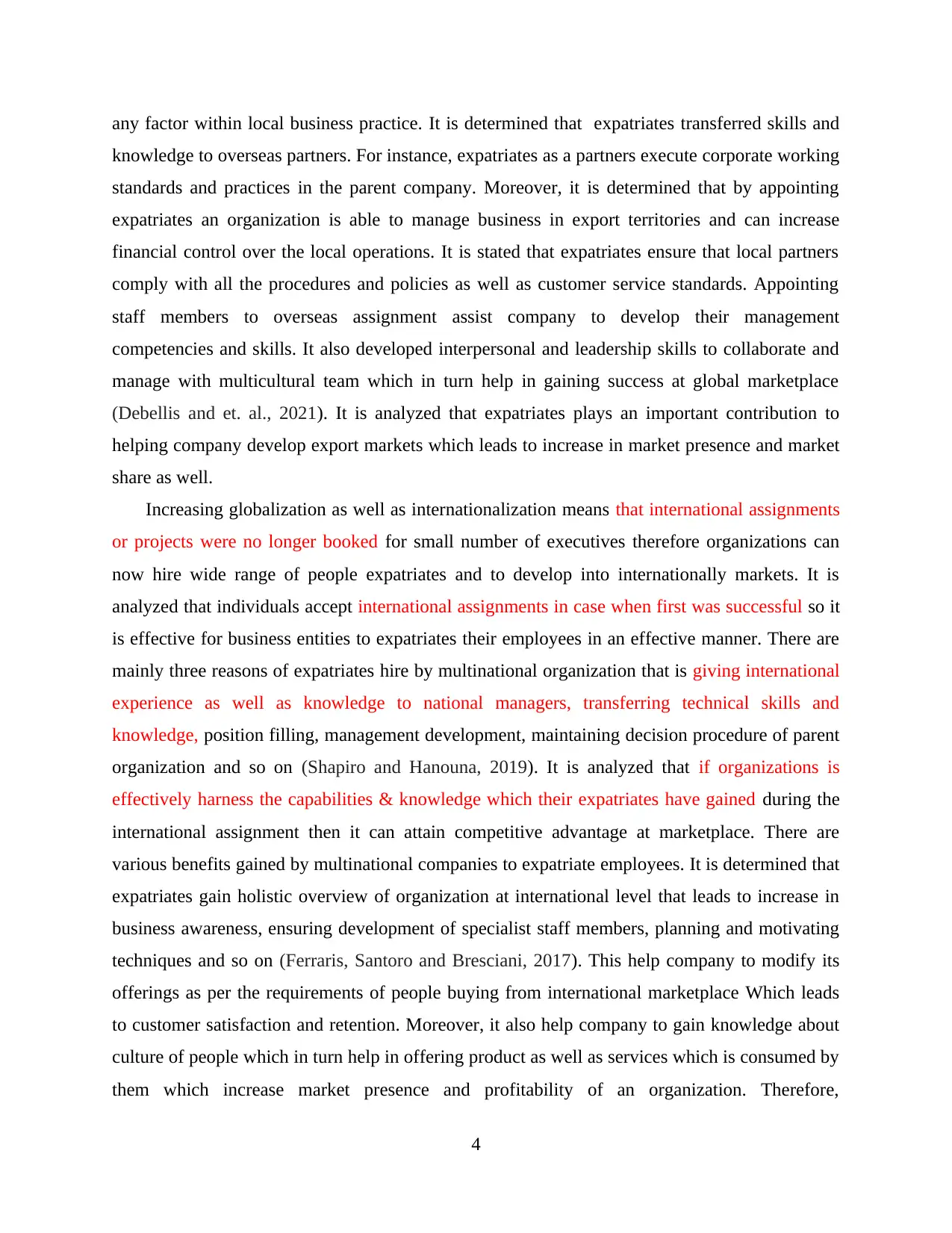
any factor within local business practice. It is determined that expatriates transferred skills and
knowledge to overseas partners. For instance, expatriates as a partners execute corporate working
standards and practices in the parent company. Moreover, it is determined that by appointing
expatriates an organization is able to manage business in export territories and can increase
financial control over the local operations. It is stated that expatriates ensure that local partners
comply with all the procedures and policies as well as customer service standards. Appointing
staff members to overseas assignment assist company to develop their management
competencies and skills. It also developed interpersonal and leadership skills to collaborate and
manage with multicultural team which in turn help in gaining success at global marketplace
(Debellis and et. al., 2021). It is analyzed that expatriates plays an important contribution to
helping company develop export markets which leads to increase in market presence and market
share as well.
Increasing globalization as well as internationalization means that international assignments
or projects were no longer booked for small number of executives therefore organizations can
now hire wide range of people expatriates and to develop into internationally markets. It is
analyzed that individuals accept international assignments in case when first was successful so it
is effective for business entities to expatriates their employees in an effective manner. There are
mainly three reasons of expatriates hire by multinational organization that is giving international
experience as well as knowledge to national managers, transferring technical skills and
knowledge, position filling, management development, maintaining decision procedure of parent
organization and so on (Shapiro and Hanouna, 2019). It is analyzed that if organizations is
effectively harness the capabilities & knowledge which their expatriates have gained during the
international assignment then it can attain competitive advantage at marketplace. There are
various benefits gained by multinational companies to expatriate employees. It is determined that
expatriates gain holistic overview of organization at international level that leads to increase in
business awareness, ensuring development of specialist staff members, planning and motivating
techniques and so on (Ferraris, Santoro and Bresciani, 2017). This help company to modify its
offerings as per the requirements of people buying from international marketplace Which leads
to customer satisfaction and retention. Moreover, it also help company to gain knowledge about
culture of people which in turn help in offering product as well as services which is consumed by
them which increase market presence and profitability of an organization. Therefore,
4
knowledge to overseas partners. For instance, expatriates as a partners execute corporate working
standards and practices in the parent company. Moreover, it is determined that by appointing
expatriates an organization is able to manage business in export territories and can increase
financial control over the local operations. It is stated that expatriates ensure that local partners
comply with all the procedures and policies as well as customer service standards. Appointing
staff members to overseas assignment assist company to develop their management
competencies and skills. It also developed interpersonal and leadership skills to collaborate and
manage with multicultural team which in turn help in gaining success at global marketplace
(Debellis and et. al., 2021). It is analyzed that expatriates plays an important contribution to
helping company develop export markets which leads to increase in market presence and market
share as well.
Increasing globalization as well as internationalization means that international assignments
or projects were no longer booked for small number of executives therefore organizations can
now hire wide range of people expatriates and to develop into internationally markets. It is
analyzed that individuals accept international assignments in case when first was successful so it
is effective for business entities to expatriates their employees in an effective manner. There are
mainly three reasons of expatriates hire by multinational organization that is giving international
experience as well as knowledge to national managers, transferring technical skills and
knowledge, position filling, management development, maintaining decision procedure of parent
organization and so on (Shapiro and Hanouna, 2019). It is analyzed that if organizations is
effectively harness the capabilities & knowledge which their expatriates have gained during the
international assignment then it can attain competitive advantage at marketplace. There are
various benefits gained by multinational companies to expatriate employees. It is determined that
expatriates gain holistic overview of organization at international level that leads to increase in
business awareness, ensuring development of specialist staff members, planning and motivating
techniques and so on (Ferraris, Santoro and Bresciani, 2017). This help company to modify its
offerings as per the requirements of people buying from international marketplace Which leads
to customer satisfaction and retention. Moreover, it also help company to gain knowledge about
culture of people which in turn help in offering product as well as services which is consumed by
them which increase market presence and profitability of an organization. Therefore,
4
Paraphrase This Document
Need a fresh take? Get an instant paraphrase of this document with our AI Paraphraser
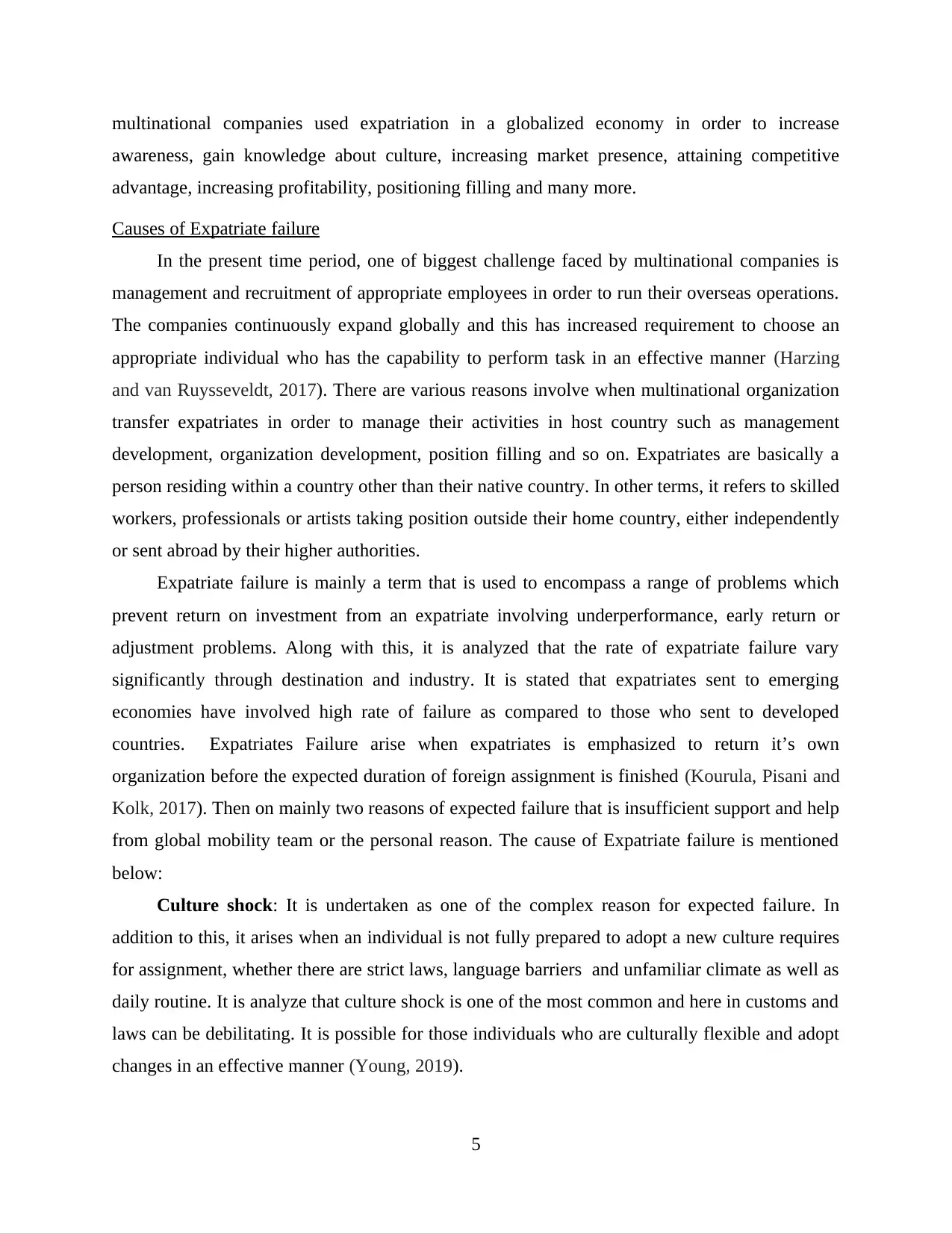
multinational companies used expatriation in a globalized economy in order to increase
awareness, gain knowledge about culture, increasing market presence, attaining competitive
advantage, increasing profitability, positioning filling and many more.
Causes of Expatriate failure
In the present time period, one of biggest challenge faced by multinational companies is
management and recruitment of appropriate employees in order to run their overseas operations.
The companies continuously expand globally and this has increased requirement to choose an
appropriate individual who has the capability to perform task in an effective manner (Harzing
and van Ruysseveldt, 2017). There are various reasons involve when multinational organization
transfer expatriates in order to manage their activities in host country such as management
development, organization development, position filling and so on. Expatriates are basically a
person residing within a country other than their native country. In other terms, it refers to skilled
workers, professionals or artists taking position outside their home country, either independently
or sent abroad by their higher authorities.
Expatriate failure is mainly a term that is used to encompass a range of problems which
prevent return on investment from an expatriate involving underperformance, early return or
adjustment problems. Along with this, it is analyzed that the rate of expatriate failure vary
significantly through destination and industry. It is stated that expatriates sent to emerging
economies have involved high rate of failure as compared to those who sent to developed
countries. Expatriates Failure arise when expatriates is emphasized to return it’s own
organization before the expected duration of foreign assignment is finished (Kourula, Pisani and
Kolk, 2017). Then on mainly two reasons of expected failure that is insufficient support and help
from global mobility team or the personal reason. The cause of Expatriate failure is mentioned
below:
Culture shock: It is undertaken as one of the complex reason for expected failure. In
addition to this, it arises when an individual is not fully prepared to adopt a new culture requires
for assignment, whether there are strict laws, language barriers and unfamiliar climate as well as
daily routine. It is analyze that culture shock is one of the most common and here in customs and
laws can be debilitating. It is possible for those individuals who are culturally flexible and adopt
changes in an effective manner (Young, 2019).
5
awareness, gain knowledge about culture, increasing market presence, attaining competitive
advantage, increasing profitability, positioning filling and many more.
Causes of Expatriate failure
In the present time period, one of biggest challenge faced by multinational companies is
management and recruitment of appropriate employees in order to run their overseas operations.
The companies continuously expand globally and this has increased requirement to choose an
appropriate individual who has the capability to perform task in an effective manner (Harzing
and van Ruysseveldt, 2017). There are various reasons involve when multinational organization
transfer expatriates in order to manage their activities in host country such as management
development, organization development, position filling and so on. Expatriates are basically a
person residing within a country other than their native country. In other terms, it refers to skilled
workers, professionals or artists taking position outside their home country, either independently
or sent abroad by their higher authorities.
Expatriate failure is mainly a term that is used to encompass a range of problems which
prevent return on investment from an expatriate involving underperformance, early return or
adjustment problems. Along with this, it is analyzed that the rate of expatriate failure vary
significantly through destination and industry. It is stated that expatriates sent to emerging
economies have involved high rate of failure as compared to those who sent to developed
countries. Expatriates Failure arise when expatriates is emphasized to return it’s own
organization before the expected duration of foreign assignment is finished (Kourula, Pisani and
Kolk, 2017). Then on mainly two reasons of expected failure that is insufficient support and help
from global mobility team or the personal reason. The cause of Expatriate failure is mentioned
below:
Culture shock: It is undertaken as one of the complex reason for expected failure. In
addition to this, it arises when an individual is not fully prepared to adopt a new culture requires
for assignment, whether there are strict laws, language barriers and unfamiliar climate as well as
daily routine. It is analyze that culture shock is one of the most common and here in customs and
laws can be debilitating. It is possible for those individuals who are culturally flexible and adopt
changes in an effective manner (Young, 2019).
5
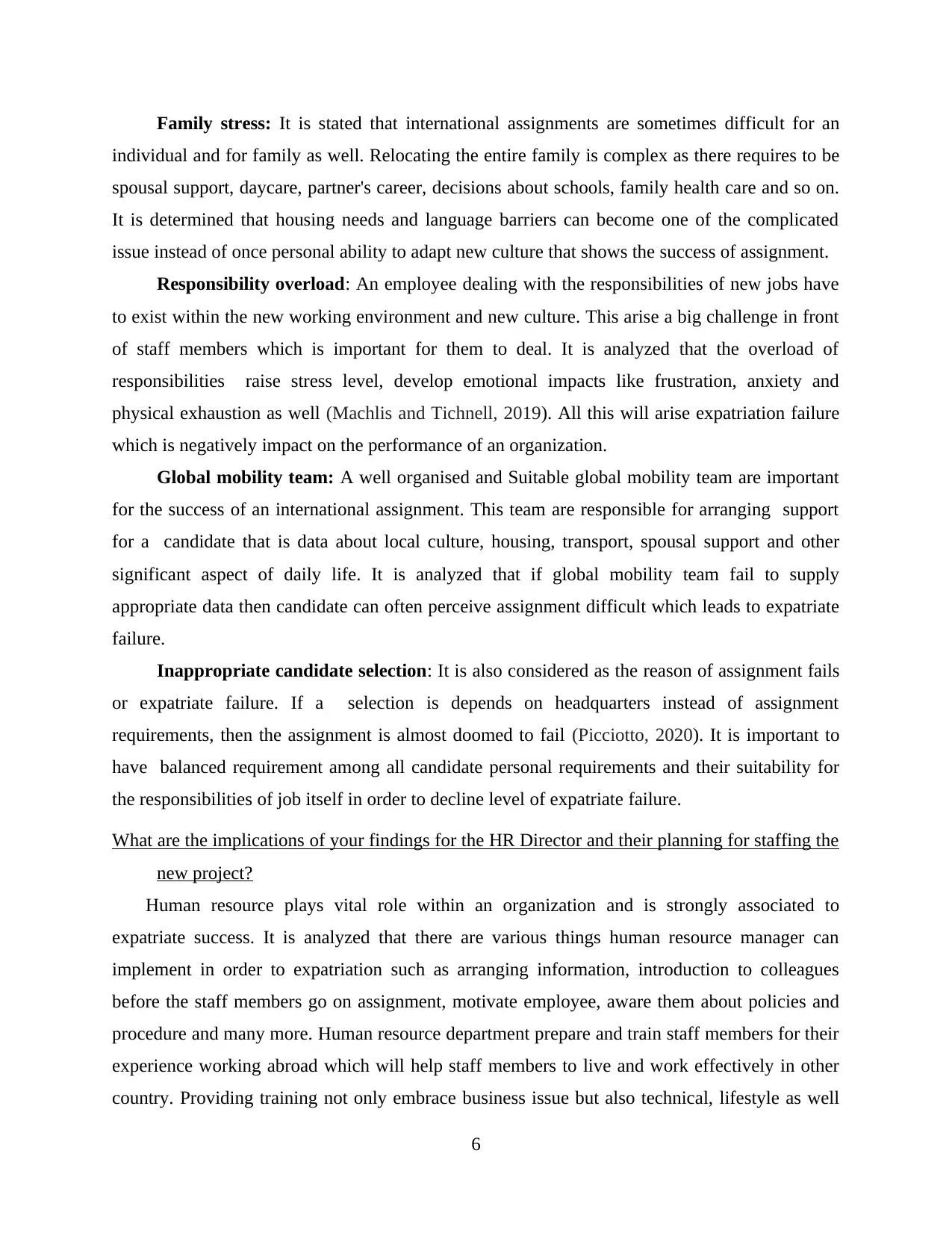
Family stress: It is stated that international assignments are sometimes difficult for an
individual and for family as well. Relocating the entire family is complex as there requires to be
spousal support, daycare, partner's career, decisions about schools, family health care and so on.
It is determined that housing needs and language barriers can become one of the complicated
issue instead of once personal ability to adapt new culture that shows the success of assignment.
Responsibility overload: An employee dealing with the responsibilities of new jobs have
to exist within the new working environment and new culture. This arise a big challenge in front
of staff members which is important for them to deal. It is analyzed that the overload of
responsibilities raise stress level, develop emotional impacts like frustration, anxiety and
physical exhaustion as well (Machlis and Tichnell, 2019). All this will arise expatriation failure
which is negatively impact on the performance of an organization.
Global mobility team: A well organised and Suitable global mobility team are important
for the success of an international assignment. This team are responsible for arranging support
for a candidate that is data about local culture, housing, transport, spousal support and other
significant aspect of daily life. It is analyzed that if global mobility team fail to supply
appropriate data then candidate can often perceive assignment difficult which leads to expatriate
failure.
Inappropriate candidate selection: It is also considered as the reason of assignment fails
or expatriate failure. If a selection is depends on headquarters instead of assignment
requirements, then the assignment is almost doomed to fail (Picciotto, 2020). It is important to
have balanced requirement among all candidate personal requirements and their suitability for
the responsibilities of job itself in order to decline level of expatriate failure.
What are the implications of your findings for the HR Director and their planning for staffing the
new project?
Human resource plays vital role within an organization and is strongly associated to
expatriate success. It is analyzed that there are various things human resource manager can
implement in order to expatriation such as arranging information, introduction to colleagues
before the staff members go on assignment, motivate employee, aware them about policies and
procedure and many more. Human resource department prepare and train staff members for their
experience working abroad which will help staff members to live and work effectively in other
country. Providing training not only embrace business issue but also technical, lifestyle as well
6
individual and for family as well. Relocating the entire family is complex as there requires to be
spousal support, daycare, partner's career, decisions about schools, family health care and so on.
It is determined that housing needs and language barriers can become one of the complicated
issue instead of once personal ability to adapt new culture that shows the success of assignment.
Responsibility overload: An employee dealing with the responsibilities of new jobs have
to exist within the new working environment and new culture. This arise a big challenge in front
of staff members which is important for them to deal. It is analyzed that the overload of
responsibilities raise stress level, develop emotional impacts like frustration, anxiety and
physical exhaustion as well (Machlis and Tichnell, 2019). All this will arise expatriation failure
which is negatively impact on the performance of an organization.
Global mobility team: A well organised and Suitable global mobility team are important
for the success of an international assignment. This team are responsible for arranging support
for a candidate that is data about local culture, housing, transport, spousal support and other
significant aspect of daily life. It is analyzed that if global mobility team fail to supply
appropriate data then candidate can often perceive assignment difficult which leads to expatriate
failure.
Inappropriate candidate selection: It is also considered as the reason of assignment fails
or expatriate failure. If a selection is depends on headquarters instead of assignment
requirements, then the assignment is almost doomed to fail (Picciotto, 2020). It is important to
have balanced requirement among all candidate personal requirements and their suitability for
the responsibilities of job itself in order to decline level of expatriate failure.
What are the implications of your findings for the HR Director and their planning for staffing the
new project?
Human resource plays vital role within an organization and is strongly associated to
expatriate success. It is analyzed that there are various things human resource manager can
implement in order to expatriation such as arranging information, introduction to colleagues
before the staff members go on assignment, motivate employee, aware them about policies and
procedure and many more. Human resource department prepare and train staff members for their
experience working abroad which will help staff members to live and work effectively in other
country. Providing training not only embrace business issue but also technical, lifestyle as well
6
⊘ This is a preview!⊘
Do you want full access?
Subscribe today to unlock all pages.

Trusted by 1+ million students worldwide
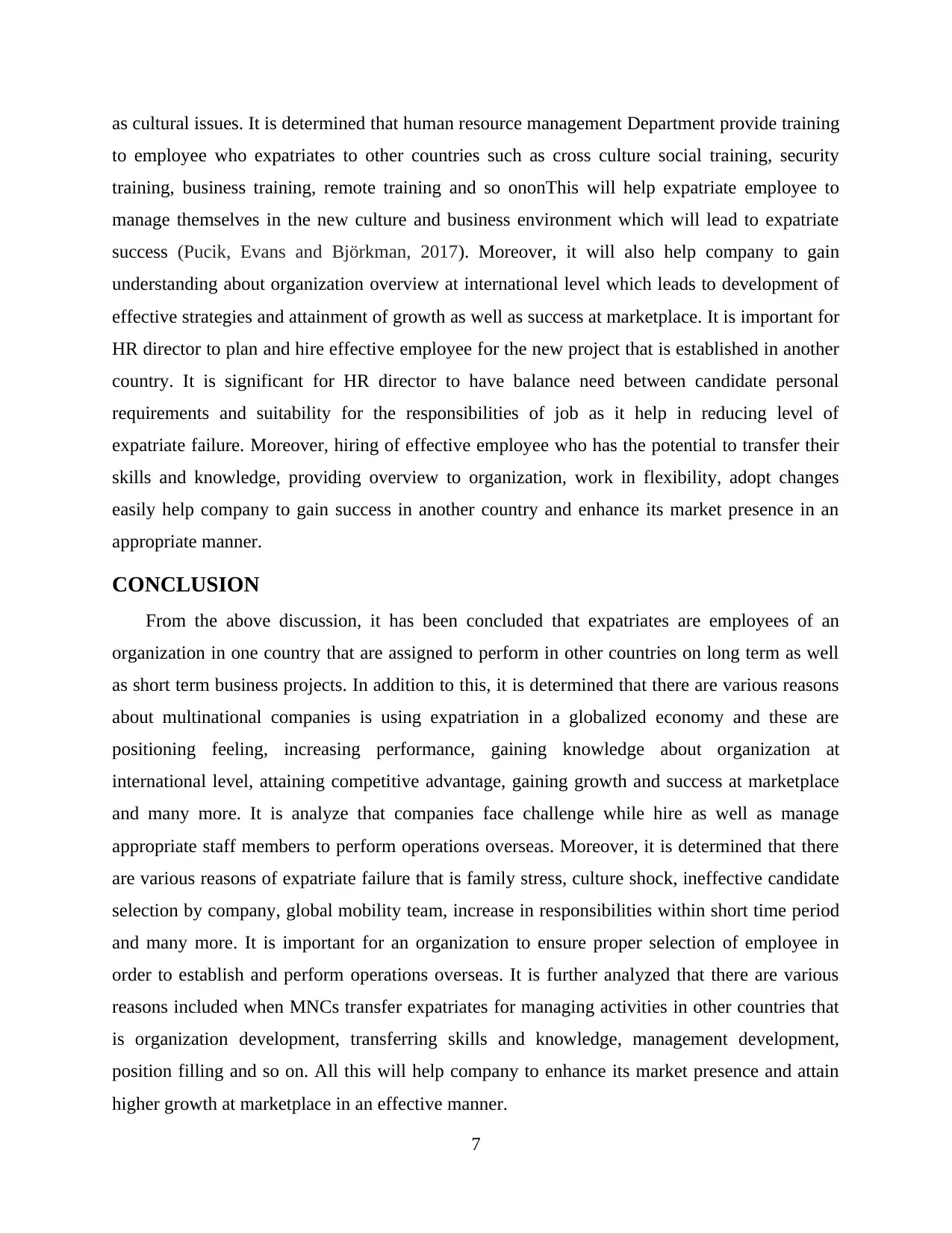
as cultural issues. It is determined that human resource management Department provide training
to employee who expatriates to other countries such as cross culture social training, security
training, business training, remote training and so ononThis will help expatriate employee to
manage themselves in the new culture and business environment which will lead to expatriate
success (Pucik, Evans and Björkman, 2017). Moreover, it will also help company to gain
understanding about organization overview at international level which leads to development of
effective strategies and attainment of growth as well as success at marketplace. It is important for
HR director to plan and hire effective employee for the new project that is established in another
country. It is significant for HR director to have balance need between candidate personal
requirements and suitability for the responsibilities of job as it help in reducing level of
expatriate failure. Moreover, hiring of effective employee who has the potential to transfer their
skills and knowledge, providing overview to organization, work in flexibility, adopt changes
easily help company to gain success in another country and enhance its market presence in an
appropriate manner.
CONCLUSION
From the above discussion, it has been concluded that expatriates are employees of an
organization in one country that are assigned to perform in other countries on long term as well
as short term business projects. In addition to this, it is determined that there are various reasons
about multinational companies is using expatriation in a globalized economy and these are
positioning feeling, increasing performance, gaining knowledge about organization at
international level, attaining competitive advantage, gaining growth and success at marketplace
and many more. It is analyze that companies face challenge while hire as well as manage
appropriate staff members to perform operations overseas. Moreover, it is determined that there
are various reasons of expatriate failure that is family stress, culture shock, ineffective candidate
selection by company, global mobility team, increase in responsibilities within short time period
and many more. It is important for an organization to ensure proper selection of employee in
order to establish and perform operations overseas. It is further analyzed that there are various
reasons included when MNCs transfer expatriates for managing activities in other countries that
is organization development, transferring skills and knowledge, management development,
position filling and so on. All this will help company to enhance its market presence and attain
higher growth at marketplace in an effective manner.
7
to employee who expatriates to other countries such as cross culture social training, security
training, business training, remote training and so ononThis will help expatriate employee to
manage themselves in the new culture and business environment which will lead to expatriate
success (Pucik, Evans and Björkman, 2017). Moreover, it will also help company to gain
understanding about organization overview at international level which leads to development of
effective strategies and attainment of growth as well as success at marketplace. It is important for
HR director to plan and hire effective employee for the new project that is established in another
country. It is significant for HR director to have balance need between candidate personal
requirements and suitability for the responsibilities of job as it help in reducing level of
expatriate failure. Moreover, hiring of effective employee who has the potential to transfer their
skills and knowledge, providing overview to organization, work in flexibility, adopt changes
easily help company to gain success in another country and enhance its market presence in an
appropriate manner.
CONCLUSION
From the above discussion, it has been concluded that expatriates are employees of an
organization in one country that are assigned to perform in other countries on long term as well
as short term business projects. In addition to this, it is determined that there are various reasons
about multinational companies is using expatriation in a globalized economy and these are
positioning feeling, increasing performance, gaining knowledge about organization at
international level, attaining competitive advantage, gaining growth and success at marketplace
and many more. It is analyze that companies face challenge while hire as well as manage
appropriate staff members to perform operations overseas. Moreover, it is determined that there
are various reasons of expatriate failure that is family stress, culture shock, ineffective candidate
selection by company, global mobility team, increase in responsibilities within short time period
and many more. It is important for an organization to ensure proper selection of employee in
order to establish and perform operations overseas. It is further analyzed that there are various
reasons included when MNCs transfer expatriates for managing activities in other countries that
is organization development, transferring skills and knowledge, management development,
position filling and so on. All this will help company to enhance its market presence and attain
higher growth at marketplace in an effective manner.
7
Paraphrase This Document
Need a fresh take? Get an instant paraphrase of this document with our AI Paraphraser

8
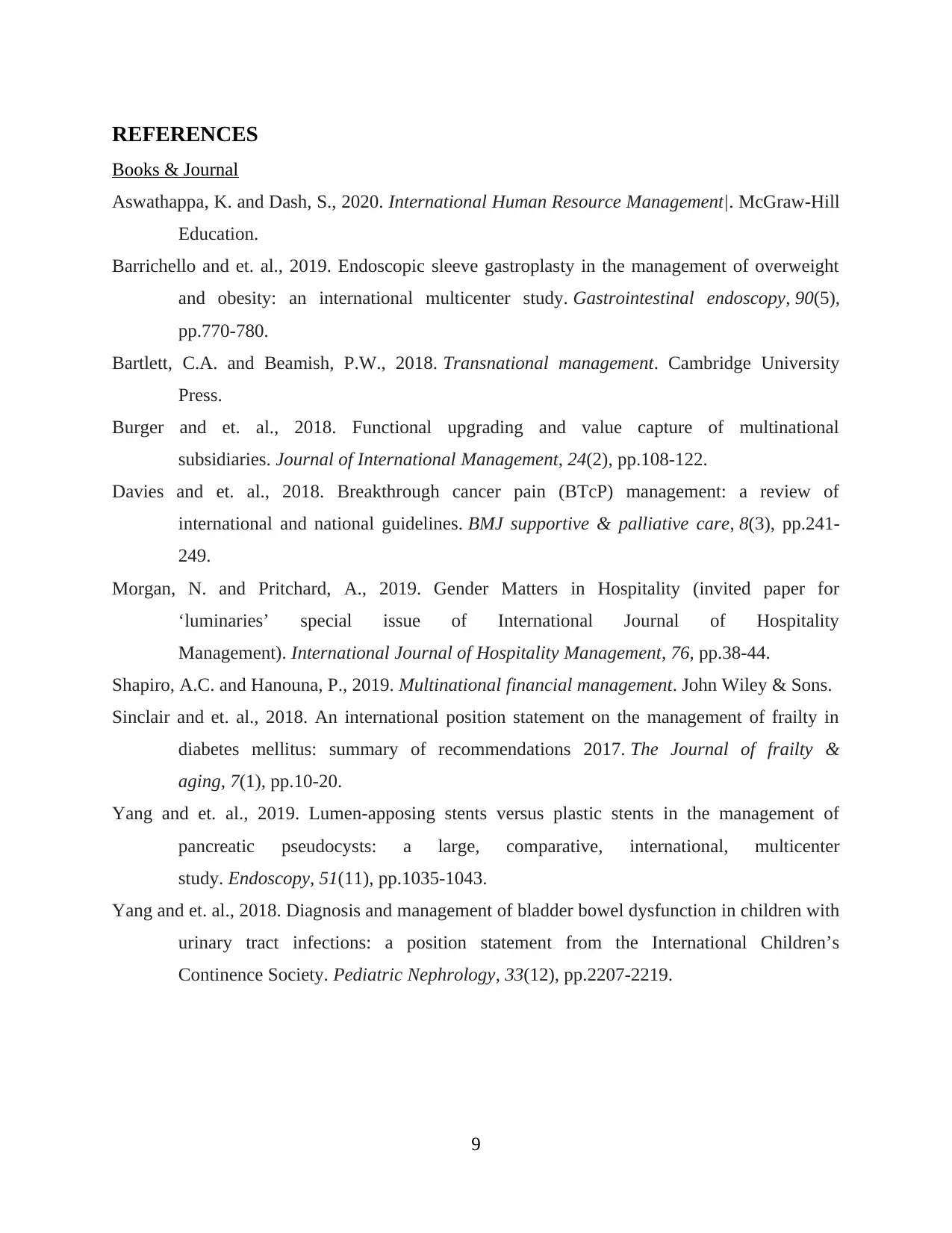
REFERENCES
Books & Journal
Aswathappa, K. and Dash, S., 2020. International Human Resource Management|. McGraw-Hill
Education.
Barrichello and et. al., 2019. Endoscopic sleeve gastroplasty in the management of overweight
and obesity: an international multicenter study. Gastrointestinal endoscopy, 90(5),
pp.770-780.
Bartlett, C.A. and Beamish, P.W., 2018. Transnational management. Cambridge University
Press.
Burger and et. al., 2018. Functional upgrading and value capture of multinational
subsidiaries. Journal of International Management, 24(2), pp.108-122.
Davies and et. al., 2018. Breakthrough cancer pain (BTcP) management: a review of
international and national guidelines. BMJ supportive & palliative care, 8(3), pp.241-
249.
Morgan, N. and Pritchard, A., 2019. Gender Matters in Hospitality (invited paper for
‘luminaries’ special issue of International Journal of Hospitality
Management). International Journal of Hospitality Management, 76, pp.38-44.
Shapiro, A.C. and Hanouna, P., 2019. Multinational financial management. John Wiley & Sons.
Sinclair and et. al., 2018. An international position statement on the management of frailty in
diabetes mellitus: summary of recommendations 2017. The Journal of frailty &
aging, 7(1), pp.10-20.
Yang and et. al., 2019. Lumen-apposing stents versus plastic stents in the management of
pancreatic pseudocysts: a large, comparative, international, multicenter
study. Endoscopy, 51(11), pp.1035-1043.
Yang and et. al., 2018. Diagnosis and management of bladder bowel dysfunction in children with
urinary tract infections: a position statement from the International Children’s
Continence Society. Pediatric Nephrology, 33(12), pp.2207-2219.
9
Books & Journal
Aswathappa, K. and Dash, S., 2020. International Human Resource Management|. McGraw-Hill
Education.
Barrichello and et. al., 2019. Endoscopic sleeve gastroplasty in the management of overweight
and obesity: an international multicenter study. Gastrointestinal endoscopy, 90(5),
pp.770-780.
Bartlett, C.A. and Beamish, P.W., 2018. Transnational management. Cambridge University
Press.
Burger and et. al., 2018. Functional upgrading and value capture of multinational
subsidiaries. Journal of International Management, 24(2), pp.108-122.
Davies and et. al., 2018. Breakthrough cancer pain (BTcP) management: a review of
international and national guidelines. BMJ supportive & palliative care, 8(3), pp.241-
249.
Morgan, N. and Pritchard, A., 2019. Gender Matters in Hospitality (invited paper for
‘luminaries’ special issue of International Journal of Hospitality
Management). International Journal of Hospitality Management, 76, pp.38-44.
Shapiro, A.C. and Hanouna, P., 2019. Multinational financial management. John Wiley & Sons.
Sinclair and et. al., 2018. An international position statement on the management of frailty in
diabetes mellitus: summary of recommendations 2017. The Journal of frailty &
aging, 7(1), pp.10-20.
Yang and et. al., 2019. Lumen-apposing stents versus plastic stents in the management of
pancreatic pseudocysts: a large, comparative, international, multicenter
study. Endoscopy, 51(11), pp.1035-1043.
Yang and et. al., 2018. Diagnosis and management of bladder bowel dysfunction in children with
urinary tract infections: a position statement from the International Children’s
Continence Society. Pediatric Nephrology, 33(12), pp.2207-2219.
9
⊘ This is a preview!⊘
Do you want full access?
Subscribe today to unlock all pages.

Trusted by 1+ million students worldwide
1 out of 9
Related Documents
Your All-in-One AI-Powered Toolkit for Academic Success.
+13062052269
info@desklib.com
Available 24*7 on WhatsApp / Email
![[object Object]](/_next/static/media/star-bottom.7253800d.svg)
Unlock your academic potential
Copyright © 2020–2026 A2Z Services. All Rights Reserved. Developed and managed by ZUCOL.





